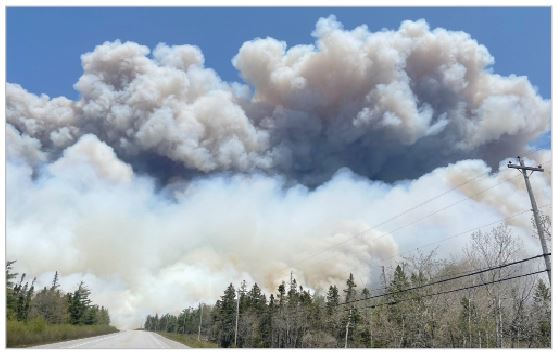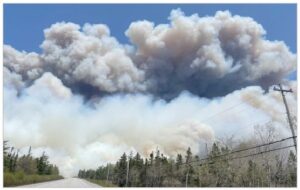All of Canada in the grip of flames and smoke. But France sends aid only to Quebec
TORONTO – An unprecedented emergency. Canada could see a “record” level of burnt area this year: nine provinces and territories are already currently battling wildfires that have forced the evacuation of more than 100,000 people across the country since early May, government officials said today, showing wildfire risks are set to rise this month and remain “unusually high” throughout the summer in Canada.
“Every province and territory will need to be on high alert during this fire season” said Natural Resources Minister, Jonathan Wilkinson. Since the start of the year, 2,214 fires have already burned 3.3 million hectares of land, which is “ten times” the normal average for the season, Wilkinson added.
As of June 4, more than 400 active fires were burning across the country, according to data from the Canadian Interagency Forest Fire Center.
At the moment, the critical situations are those of Alberta, Nova Scotia and Quebec: both the Canadian army and hundreds of firefighters have been mobilized, 950 of whom come from other countries such as the USA, Australia, New Zealand and South Africa (plus those arriving from France and Costa Rica). Also today, Prime Minister Justin Trudeau said that “Canada should have enough resources to cover the summer months. And if things get worse, we are developing contingency plans”.
But the damages caused by the flames are also added by those of the smoke which continues to worsen the air quality in many regions of the country, from northern Alberta to the Atlantic.
In Alberta, the fire situation – which had burned more than a million acres as of Saturday – has improved, prompting officials to announce the end of the provincial state of emergency, but for some areas of the province, as well as northern British Columbia and the Northwest Territories, the air quality alarm has sounded. According to the World Air Quality Index, the air quality in the Meander River in northwest Alberta is currently worse than that in Bangladesh’s capital, Dhaka.
Also in Nova Scotia, where the fires have caused the evacuation of 16,000 people (with about 200 structures, including 151 homes, damaged or destroyed in Halifax alone) and where more than 24,000 acres still burn in Barrington Lake County, alarm is for air quality.
In Quebec, where the number of fires rose to 156 on Sunday, several warnings were issued due to poor air quality, including in the Montreal area. Air quality in Obedjiwan, a First Nation in south-central Quebec, is worse than some areas in Delhi, India, according to the World Air Quality Index.
The situation is no different in some parts of Ontario: the World Air Quality Index indicates that air pollution in Peterborough, northeast of Toronto, is worse than in Beijing.
But France only sends firefighters to Quebec
MONTREAL – France to send firefighters to help Quebec as it is battling massive forest fires. French President Emmanuel Macron tweeted on Sunday that France was “united” in its desire to help. “A hundred of our firefighters are preparing to fight the flames together with their comrades from Quebec. Experts are also mobilized” he tweeted in French, adding: “Friends Canadians, reinforcements are on the way”. Meaning, by “Canadians”, only the inhabitants of Quebec, since reinforcements will only be sent there. “Merci, cousins!” Quebec premier Francois Legault replied on Twitter. Prime Minister Justin Trudeau also thanked the French president, tweeting in French: “Our two countries are the closest friends and strongest partners, and this relationship is more important than ever”. Currently, nine Canadian provinces and territories are currently battling fires, but only one of them will enjoy “aid” from France: Quebec.
In the photo above, one of the fires in Nova Scotia (photo from Twitter – @NS_DNRR)




